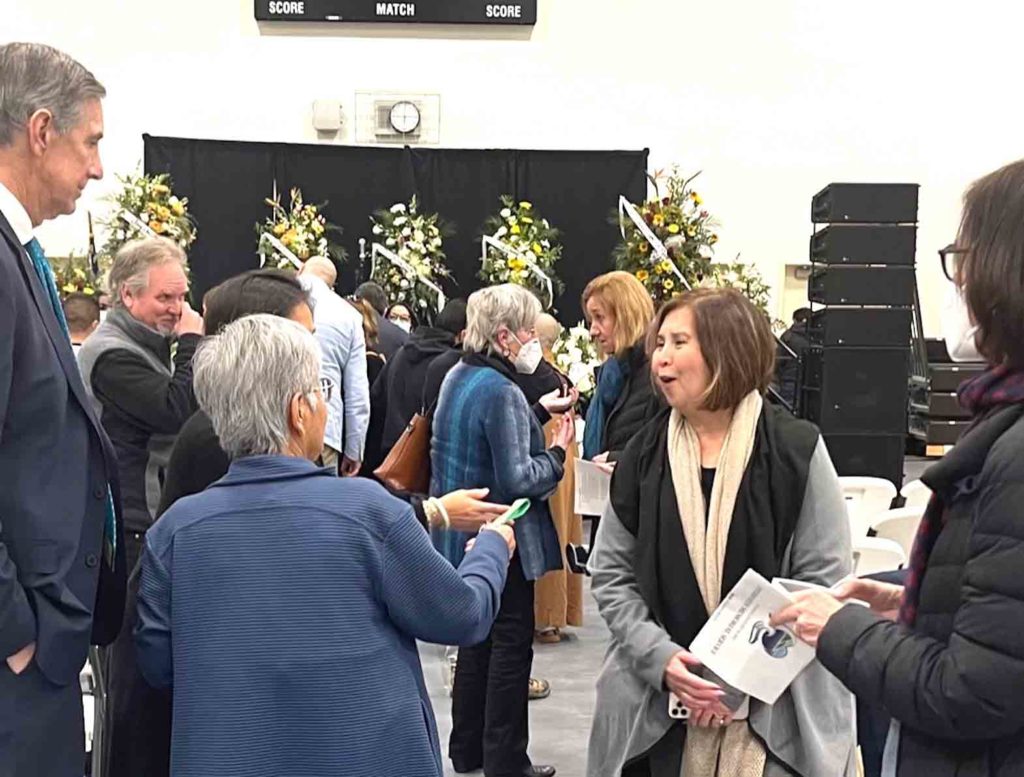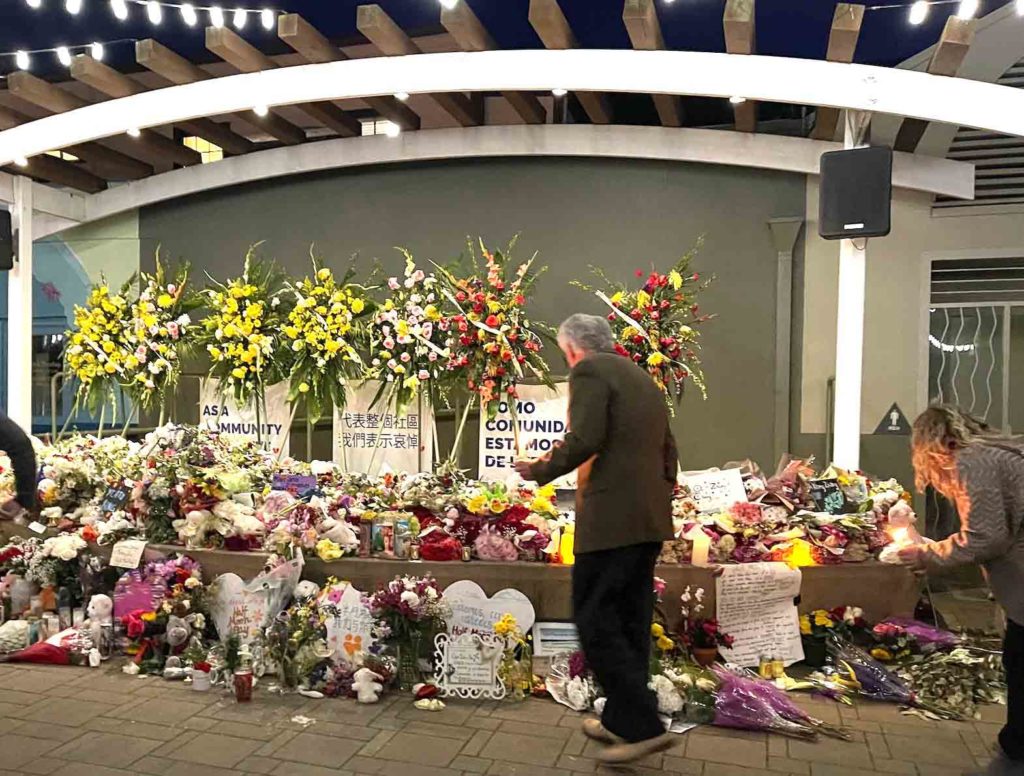Fil-Am officials challenge authorities to unite and stop gun death epidemic

SSF Mayor Flor Nicolas (right) greets (from left) San Mateo County Manager Mike Callagy, Harbor Commissioner Virginia Chiang Kiraly, and former Half Moon Bay Mayor Naomi Partridge before joining the procession and fellowship. . NENAR NICOLAS
DALY CITY, California – “Shock” and “fear” were uttered repeatedly by Californians frustrated by deadly gun violence, so were assertions of solidarity in action as leaders conveyed sympathy and shared resources for what has become a nationwide problem.
The City Council of Daly City was preparing for its second meeting of the year when news of the rampage 20 miles to the south in Half Moon Bay compelled Mayor Ray Buenaventura to deliver an extemporaneous message as a prelude and closing.
“This is coming really close to our backyard,” a somber Buenaventura said around 7 p.m., Monday, January 23 and then challenged his fellow Council members and other elected officials.
“I along with many other people really believe there is something that we must do – what that is I think is up to the City Council to discuss, deliberate and decide if there’s something we can do to stop the shootings,” Buenaventura stressed.
He added: “I wanted to recognize what happened (and) let the public know we are all very concerned. If there is something within our power to influence decision makers to actually do something in our books, we’re gonna do it. Because enough is enough.” He later adjourned the meeting in memory of the victims.
Buenaventura was referring to multiple fatal mass shootings in California, two of which involved people of color, particularly Asians, both as perpetrators and victims.
Some five hours earlier San Mateo County Sheriff deputies were deployed to Mushroom Mountain Farm on San Mateo Road (Highway 92), where they found four people shot dead and another was flown to Stanford Hospital with critical gunshot wounds. A few miles at Concord Farms on Cabrillo Highway South (Highway One), they found three more fatalities, also from gunshot wounds.
Authorities identified the suspect as a 66-year-old resident of the farm staff housing. He claimed to have been bullied by his co-workers and suffering from mental illness. Expressing regret for his actions, he said he had planned to turn himself in, which is why his vehicle was found in the parking lot of the Sheriff’s Half Moon Bay substation before 5 p.m.
Intersection
Buenaventura’s fellow Filipino American Council members later told Inquirer.net they understood his pronouncement.
“There’s the intersection of ensuring there are stronger gun control measures as well as providing access to mental health services” and “de-stigmatization” of mental issues, said Vice Mayor Juslyn Manalo. The housing advocate emphasized the need for “equitable housing conditions” for those who grow the food for the community.
Immediate past Mayor Rod Daus Magbual pushed for education, “especially Ethnic Studies” as a means for officials in “all levels of government to be accountable to constituents.”
“We will continue to have these types of shootings if we don’t look at the root causes of violence,” cautioned the Skyline College professor, whose curricula cover “historical political and economic factors that normalize violence in our society.”
Council Member Glenn Sylvester indicated support for awareness programs for mental health issues “which could lead to crimes committed.”
“It is very difficult to understand or detect a person with a mental problem,” the retired SFPD sergeant laid out his concerns, adding, “If you outlaw guns, then only outlaws will have guns. The right to bear arms is gently for protecting yourself at home or for owners of their businesses.”
Addressing trauma
The City of South San Francisco lowered the U.S. flag to half-staff to honor those who died in the recent tragedies. Mayor Flor Nicolas highlighted the shootings in her weekly Update from the Mayor emailed to 3,000 recipients.
“Yet again, we are left shaken and struggling to understand why such terrible things happen,” she said. “While there may never be satisfactory answers to these questions, we do know that it is normal for people to experience a variety of emotions following such traumatic events. We, and our neighbors throughout the Bay Area, are experiencing grief, coupled with fear and disbelief. The impact of these traumatic events is significant.”
Nicolas named ways to “support affected farm worker communities.” She listed nonprofits ALAS Ayudando Latinos A Soñar or Helping Latinos to Dream(https://www.alasdreams.com or 650-560-8947), a Latino-centered multiservice organization and Coastside Hope admin@coastsidehope.org or 650-523-3519), provider of safety-net programs for families on the coast. Both are accepting donations.
She gave tips for a safe and healing environment from Sitike, an outpatient counseling center based in South San Francisco. (See sideba). She provided the schedule of related community gatherings and personally attended the Jan. 31 Interfaith Community memorial, procession and fellowship in Half Moon Bay.
San Mateo County Human Services Agency is leading care and shelter efforts for the affected farm workers, HSA Assistant Director Jei Africa told Inquirer.net at press time.

Flowers abound, candles glow and messages of hope pour out for the Half Moon Bay community at the Jan. 31 Our Lady of the Pillar and Coastside Interfaith Community memorial on Main Street. NENAR NICOLAS
Meanwhile, the City Council of Colma held a moment of silence for the victims at their Jan. 25 meeting, according to Mayor Joanne del Rosario.
Caution and vigilance
The Half Moon Bay killings occurred two days after a 72-year-old Hemet resident opened fire at a dance studio on Lunar New Year’s Eve in Monterey Park, a predominantly Chinese enclave in Southern California. The gunman’s motive remains unclear. Police say he shot himself as they closed in.
Filipino American Valentino Alvero, 68, described by his family as the “life of the party,” was among the 12 who died in the tragedy.
“Our prayers go out to the families of the victims and we mourn with them,” the Philippine Consulate General in Los Angeles said in a statement posted on its website. “The statement also called for the “community to exercise all caution and continue being vigilant at all times.”
“Always monitor your loved ones’ and family members’ whereabouts. Immediately report any suspicious activities to local enforcement and watch out for each other,” the statement echoed recurring advice since the surge in anti-AAPI hate crimes.
SIDEBAR: Tips for coping with tragedy
- Allow your feelings. If you notice you are having strong feelings, acknowledge them. Don’t try to ignore or deny them. Remember that it is common to have a range of emotions after a traumatic incident.
- Talk about it. Give voice to and share your concerns with people you trust. It often helps to speak with others who are also experiencing emotional reactions, so you do not feel alone. You may help them as well, as they put their thoughts and feelings in order.
- Practice self-care. Engage in healthy behaviors to enhance your ability to cope. Make sure you get enough rest, eat well-balanced meals, and build physical activity into your day. Avoid alcohol and drugs as they can suppress your feelings rather than help you manage or lessen your distress. If you have having trouble sleeping, try some relaxation techniques such as deep breathing, yoga, or meditation.
- Minimize exposure to the media. Once you have the facts, it’s a good idea to limit replay of the events. Try to give yourself and your family a break from the intensity of what’s going on. Being overexposed can increase your stress.
- Seek support from professionals. If you are feeling stuck or overwhelmed and stress is interfering with your daily life, consulting with a counselor may be beneficial.
– Sitike is Apache for a group of non-related people who come to the aid of a person in crisis. The nonprofit partners with another nonprofit, StarVista, to run a 24/7 Crisis Hotline (650) 579-0350.

